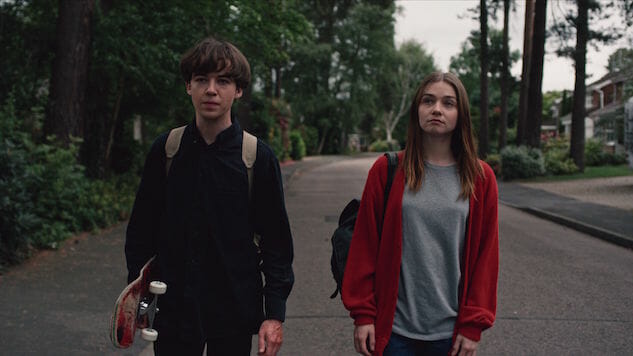How Netflix’s The End of the F***ing World Subverts TV’s Obsession with Psycho Killers
Photo: Courtesy of Netflix
The End of the F—ing World doesn’t want your morbid fascination. Or, unlike almost every other show with similar subject matter, it doesn’t want it to stay morbid. A show about a boy bent on killing his road trip partner as the two high schoolers run away from home sounds more like the grisly true-crime TV we’ve been groomed to enjoy since news channels realized fear, violence and tragedy attracted eyeballs. Yet the The End of the F—ing World gives the middle finger to this Nightcrawler-esque worldview, finding hope in a world of psychopaths, within the context of a TV landscape that loves them.
James (Alex Lawther) is 17 and kills enough small animals that he truly believes he’s a psychopath. So do we, for that matter. Hurting anything with fur is the international sign for “this kid is going to jail on Law & Order.” Alyssa (Jessica Barden) is 17 and kills nothing, not that her words lack for trying. Both are unbelievably good at being at the wrong intensity levels for normal human interaction: Barden goes loud and acerbic, while Lawther shuts down so completely it’s hard to tell if he was born or simply emerged from the Britain’s collective post-punk sigh, like a Promethean clay figure stirring from Athena’s breath.
“I’m James. I’m 17. And I’m pretty sure I’m a psychopath” is a far cry from Jughead’s treatise on being a weirdo, but it’s also a bit of self-diagnosed misdirection. Teens can want to punch their dorky dads in the face without being monsters, but more importantly, argues the show, someone who thinks they’re a monster (or even is a monster, for a moment) doesn’t have to stay that way. When James meets Alyssa, decides she’s the perfect stepping stone to test his thirst for killing, and takes her on a road trip, nobody expects where it’ll go—and that’s the series’ brilliant subversion.
The characters are ripe for a will-they/won’t-they plot, but instead of the anticipated romance, it’s murder. And we’re not rooting for Alyssa’s survival. We’re rooting for the deed to be done. Not because we’re as sadistic as the show sets up its creature-killing, dad-punching protagonist to be, but because we were trained to. While we approach The End of the F—king World with the conventions of TV psychopathy in mind, it’s desperately trying to help us unlearn our indoctrinated bloodlust—just as its hero is similarly dissuaded after actually killing someone, with a completely justifiable defense.
In dissecting why there are fewer TV series focused on redemption than on continued crimes, the autopsy must start with the body of work that already exists. We know R-rated promises get eyeballs and press (Why do you think Game of Thrones is still being discussed? Its artistic merit?) but the unredeemable villains in so much critically acclaimed TV make for weary watching and a woeful worldview.
Some shows focus on the diagnosis, pursuit, and confrontation of psychopaths: The Alienist, Mindhunter, Criminal Minds. Others place their anti-social anti-heroes in the limelight: See Sherlock’s questionably autistic genius (there’s a whole piece to be written about that trope) and Dexter’s murderous do-gooder. It can be engaging to leer at an Other, especially if that Other has already been defined as a criminal. It’s also exhausting.
-

-

-

-

-

-

-

-

-

-

-

-

-

-

-

-

-

-

-

-

-

-

-

-

-

-

-

-

-

-

-

-

-

-

-

-

-

-

-

-








































